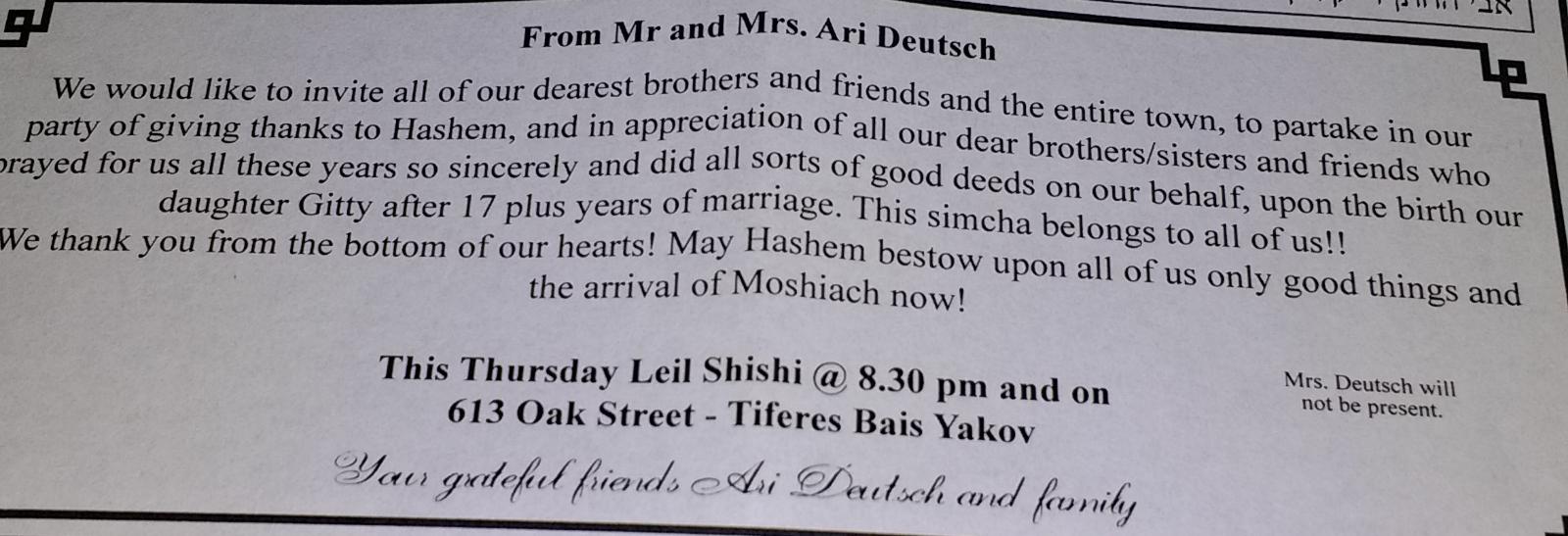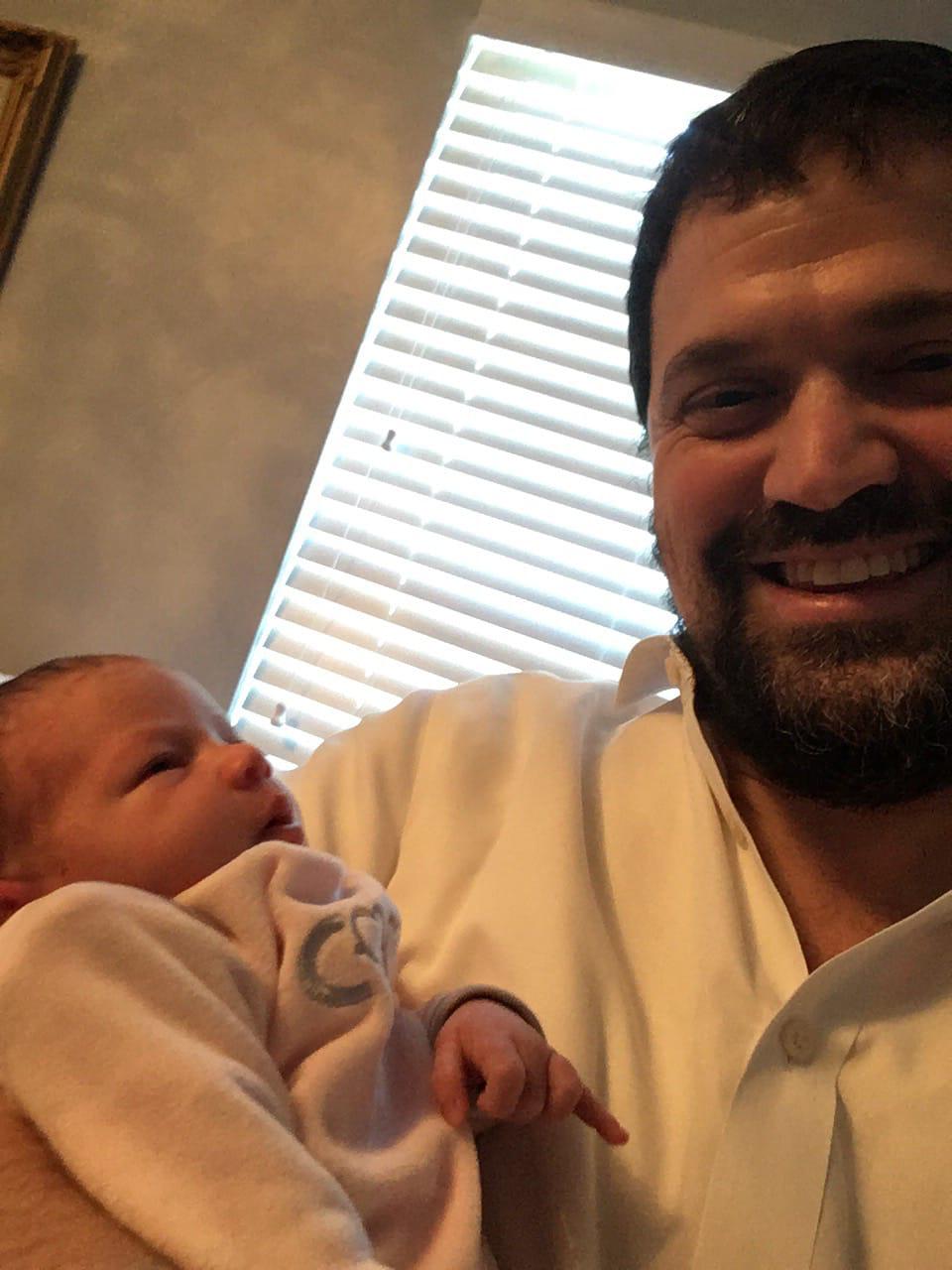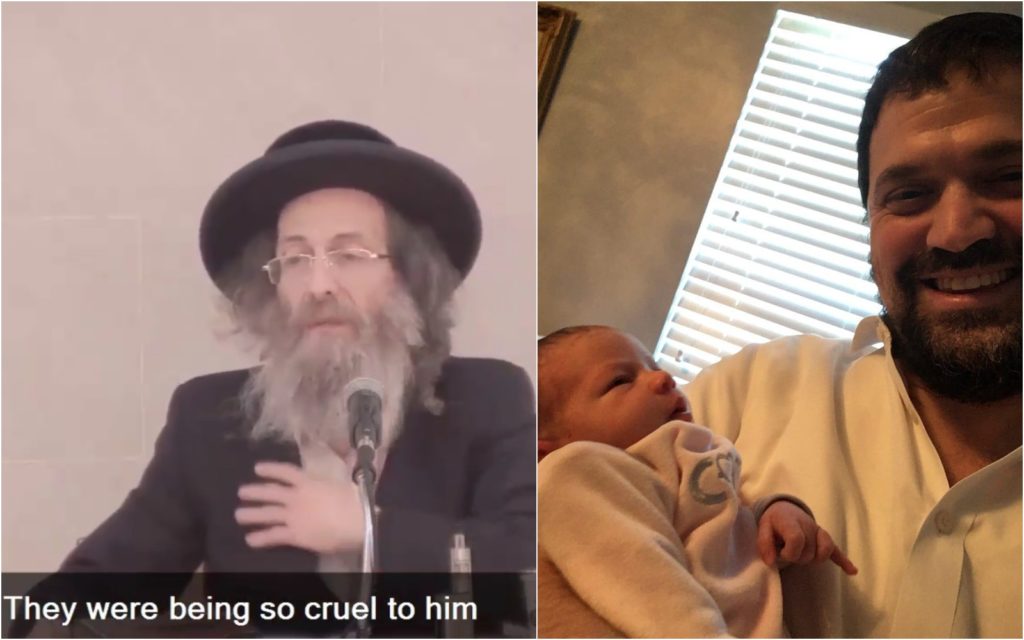R’ Meilech Biderman from Yerushalayim tells an incredible story of how a couple from Lakewood, New Jersey merited a baby daughter after 18 years of marriage:




R’ Meilech Biderman from Yerushalayim tells an incredible story of how a couple from Lakewood, New Jersey merited a baby daughter after 18 years of marriage:



Popular Posts
9 Responses
Strange story the way it’s written
post hoc ergo propter hoc is not one of the 13 midot
I have no idea what’s going on here (didn’t watch the clip, though), but, Mr Deutsch, I think she’s cute too! May you and Mrs Deutsch have only nachas until 120.
Wow, Mazel Tov Ari!! I am so happy for you! I still remember when I was going into shidduchim, you were giving me “tips” in the BMG coffee room. Wow, feels like yesterday but it’s over 17 years! You should have many more simchos iyh and only nachas!!
All the way from Michigan (go, figure it out 😉)
Beautiful. But it doesn’t always work… After having tried many times before, I went over to a former friend to try to make sholom – in public- and I was pushed away. It was so embarrassing & hurtful I left the event. Then the daughter of my dearest friend was very sick & I approached her, AND her brother, a Rav, to beg her yet again to forgive me for the wrong I did (I still am not sure what it was, but it must have been something) I said please get your sister to make sholom for (I gave him the name) that she should have a full refuah. He wrote back & said he would try.
I never heard another word. Last week was this young mother’s first yartzheit.
Do I hold my former friend responsible for the nifteress? Of course not. But no matter how hard we try, no matter how much effort we put in to make sholom, if the other person won’t be open, there is nothing we can do. I wish the Aibishter would have accepted my attempts, even if the other party was not maskim, but it was not to be.
May the Deutches have much nachas from their beautiful daughter!
DrYidd,
You mention the fallacy. Now you need to know the fallacy of the fallacy.
All medical research and all research in general determining cause and effect is based on experiences. We use our sense to decide how reasonable is it to assume cause and effect.
I don’t know the details of this case. But if for example the doctors say that the baby was born on day 265, and the fact is that from the time of travel to Reb Shayale, April 18, till birth, Jan 15, is 267 days, after not having had a child for 17 years, this would be rather interesting. Not absolute proof, but interesting. If we additionally know of several such stories, it would be rather unreasonable not to attribute effect to this cause.
hml,
Are you open to hear some criticism? I obviously don’t know anything about your story, so I could very likely be wrong, but this is what it seems to me from reading your post.
The Nifteres was very very hurt. Usually a sincere apology is accepted, but was your apology sincere? after all you say that you don’t even know what you did wrong. Basically you are looking at them and presenting them as the devil for not having sholom with you, and you are not considering that maybe there is truly something that you did which hurt them tremendously and you refuse to recognize it. Additionally, trying to make shalom in public is often a public show to prove to the world that you are the good one. That would hurt the victim even more if they are indeed a victim. It’s like adding insult to injury. The same applies to the approaching of the children, that you are speaking badly to children against their father or sister, to say that you are the peaceful one and they aren’t. These things can only make matters worse as they are not really gestures of shalom but rather of further hurting the one who is already very hurt.
A real gesture of shalom is to say the following and really mean it and hold by it. “I can’t forgive myself for the pain I caused and I wish I could do something to correct it. I am willing to do anything because I have true remorse. Please tell me how I can at least try as much as still possible to do all in my limited power to rectify and clear their name and proclaim that I admit my wrong doing”
Then whatever they ask you to do or however difficult they seem to appease, just bend over backwards and do everything to show your true remorse and to try to make things truly better for them. But at this time you can’t do this because you have no remorse.
Again, I could be totally wrong. Maybe the person is making a fight out of a total mistake.
But maybe not.
Dear Chaim Meir,
I think you may have misunderstood. My former friend, BH, is very much alive & and as far as I know, healthy & enjoying her family. May she do so for ever. The Nifteres was the daughter of ANOTHER friend, whom I watched grow up & with whom I was very close. I wanted to make sholom with Mrs. X. EVEN MORE SO after Mrs. A. A”H became sick.
Since I can only speculate as to the misdeed I committed (nobody, despite my pleading, would tell me) I didn’t know what to fix, or how to fix it. But you said ““I can’t forgive myself for the pain I caused and I wish I could do something to correct it. I am willing to do anything because I have true remorse. Please tell me how I can at least try as much as still possible to do all in my limited power to rectify {and clear their name – here you assume I badmouthed them} and proclaim that I admit my wrong doing”.
And I did. I said that, via Mrs. X’s brother, the Rav, since Mrs. X wouldn’t speak to me when I approached her at a public event. But to no avail. I didn’t care about my kovod (ha!) or pride or whatever. But I truly believed then if we could make sholom my friend’s daughter would recover, & I was prepared to do whatever it took as it seemed to me that it must have been all my fault. Just nobody would tell me what that was.
I do take exception to “But at this time you can’t do this because you have no remorse.” How do you know the level of my remorse? Again, though, it is hard to gauge what the level of remorse should have been, since to this day I cannot get clarity on what I did wrong. I admitted before, and I admit again, that clearly I did something pretty bad. Unless I actually didn’t, but until I am told, I say again I can’t fix what I don’t know is broken.
As for “looking good” by approaching her publicly…. only a few people knew of the rift and they weren’t in the vicinity when she rebuffed me. Just to be clear, I wasn’t doing it to “look good”, I was doing it a) in the hope she would be open to a “how are you?”and b) that dafka because it was public she would respond civily, even if not warmly, and that the door would open, even a crack. I honestly didn’t expect such a response.
I was once deeply hurt by someone who divulged very personal and unpleasant information in front of me in public. She tried a few times to apologize. After a while I called MY Rav & asked if I was obliged to forgive her. He said yes, but I didn’t have to be close with her in future or, as he put it, invite her to my simchas. I did as he said & funnily enough, I did feel better, although it took some time to remember! Thereafter, on the few occasions we met we were cordial & chatted like acquaintances do. It’s a real pity Mrs. X wouldn’t give me the same opportunity.
I appreciate your answer & I hope I have clarified the parties involved.
Hml,
As I said, I don’t know you or your story, so I don’t know whether my statement is relevant in your case so as far as your case in concerned I keep an open mind. The fact that you post with anonymity means that I am not really public rebuking you. But what you say about my statement that you have no remorse, that you claim to have remorse, seems a bit odd. What exactly do you have remorse about when you say that you have no idea what you did wrong? In connection to my recommendation of what to say to them, you say that you did that, I don’t know how that would be received as a sincere statement when you clearly don’t admit to wrong doing, as you say that you don’t know that you’ve done anything wrong. As far as nobody willing to tell you what you did wrong, I have a hard tine accepting that. Maybe the actual hurt party doesn’t want to talk to you, but it seems unlikely that there isn’t anyone who would tell you, like a friend of a friend. If you really care to know you probably could know. But again I might be wrong in your case as I don’t know your case.
My statement however is very relevant in many cases. Often the biggest weapon of the baal machlokes is the cloak of shalom. People need to be weary of this and not be taken in to take the side of the one who makes a presentation as the one who seeks shalom. In many or maybe most cases a person isn’t upset for no reason and unwilling to reconcile when a true reconciliation is available. I have heard of too many such stories.